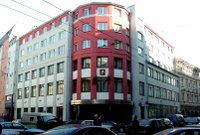 According to Russian newspaper, Nezavisimaya Gazeta, Russian communist leader Gennadiy Zyuganov considers withdrawing his candidacy for the March 2 Russian presidential elections. A withdrawal would be to protest against a similar negative PR-campaign that the Communist Party experienced during the December 2007 parliamentary elections.
According to Russian newspaper, Nezavisimaya Gazeta, Russian communist leader Gennadiy Zyuganov considers withdrawing his candidacy for the March 2 Russian presidential elections. A withdrawal would be to protest against a similar negative PR-campaign that the Communist Party experienced during the December 2007 parliamentary elections.According to recent opinion polls, Zyuganov receives surprisingly little popular support for his presidential candidacy, which would effectively force him to abandon his leadership of the communist party if they were to become official election results. Thus, even if withdrawing from the presidential race would open up to contenders to the leadership of the party, Zyuganov might consider this drastic option as preferential to a devastating election loss. According to a source in the presidential administration, the communists are currently seeking support in the Kremlin for receiving 15-20% of votes instead of the prognosticized 6%.
 In the background, forces advocating a Russian two-party system seem to be at work. Hence, a discussion of merging the communist party and Fair Russia has been renewed, which would be considerably facilitated by the dethtronisation of Zyuganov. According to Nezavizimaya Gazeta, these are the same forces that want to undermine the position of Medvedev as future president of Russia. Zyuganov is very well aware of the fact that his candidacy legitimises the election of Medvedev. In the 2004 presidential elections, Zyuganov's role was much of a stage-hand in the act of reelecting Putin.
In the background, forces advocating a Russian two-party system seem to be at work. Hence, a discussion of merging the communist party and Fair Russia has been renewed, which would be considerably facilitated by the dethtronisation of Zyuganov. According to Nezavizimaya Gazeta, these are the same forces that want to undermine the position of Medvedev as future president of Russia. Zyuganov is very well aware of the fact that his candidacy legitimises the election of Medvedev. In the 2004 presidential elections, Zyuganov's role was much of a stage-hand in the act of reelecting Putin.However, this time it seems to become the LDPR-leader, Vladimir Zhirinovski, who will conquer the second place in the presidential race. Such a result would further undermine Medvedev's legitimacy. Still, if Zyuganov would decide to step down, the effect is the same. Ending up in third place would be equal to his resignation as communist leader, why Zyuganov now seems to be playing out the legitimacy card against Medvedev to gain sufficient support in order to stay on as party leader. If Zyuganov would fail in these discussions and actually decide to withdraw, this has to happen no later than 27 January, as the communists otherwise will have to pay state election costs.
Even though Dmitry Medvedev seems sure to be elected the third president of Russia on 2 March, what goes on behind the scenes in Moscow at the moment is both interesting and confusing. It also provides further evidence that Putin and his aides are becoming increasingly dependent on the bureaucratic monster of political power that they have created during his era. What this will mean for Russia is still hard to say, but the evolving pattern bodes ill for the future.



